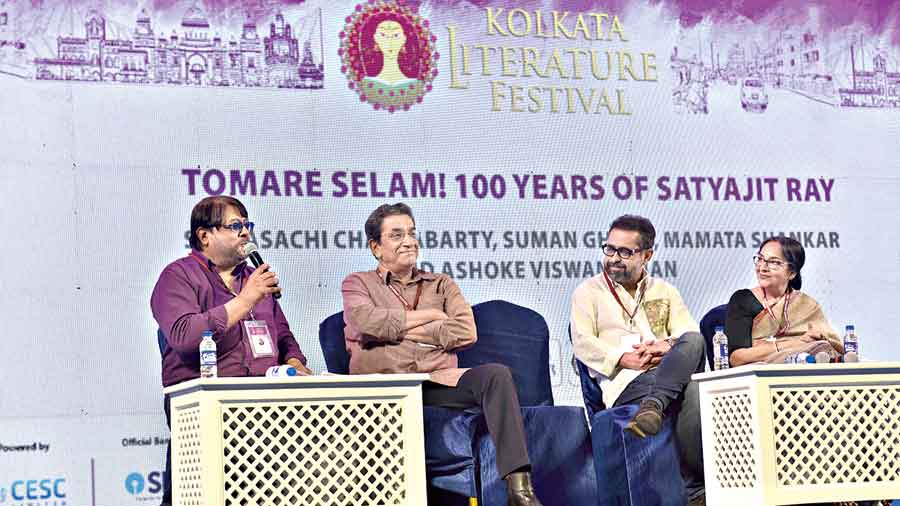A centenary salute to Satyajit Ray made for an engaging session on Friday at the Kolkata Literature Festival, held in association with The Telegraph.
Ray’s mother, Suprabha, figured prominently in filmmaker and author Suman Ghosh’s introductory address. “Not enough is said of her contribution in bringing him up after his father Sukumar died early,” he pointed out. The young widow shifted to her brother’s house in Bhowanipore in south Kolkata with her three-year-old son and would travel daily by bus in the 1930s and 40s to Vidyasagar Bani Bhavan in north Kolkata, where she worked as a suprintendant of the handicraft department.
This, Ghosh said, reminded him of Madhabi Mukherjee’s character of a working woman in Ray’s film Mahanagar. Ray’s mother knitted, stitched and sculpted too. “In raising him, she also communicated to him his family’s creative legacy. She convinced him to spend time in Santiniketan, in the proximity of Tagore. There, he learnt art from the greats of Kala Bhavana,” Ghosh stated.
Sabyasachi Chakraborty surprised the audience by revealing that he had met Ray to request him to cast him as Feluda. “He did not take me. He said: Ami korbo na. Perhaps, he felt I could not do it at the first glance itself. Kintu ami Sandip Roy-er panjabi dhore jhule porechhilam amake nitei hobe boley (But I hung on to Sandip Ray’s panjabi to insist that he take me). And he finally did,” he said candidly.
Mamata Shankar, who worked in three consecutive Ray films, spoke of Ray, the human being. “There were three ways in which he would say ‘Cut’, which reflected his level of satisfaction. In Sakha Prasakha, there is a critical scene of mine with Ranjit Mullick. When it ended, I was very relieved with the way he said ‘Cut’. But after some days, I got a call from him that a scene would have to be re-shot.” Shankar’s worst fears came true when he said it was that scene. On the day of the shoot, Ray asked Shankar for a suggestion for a change in the dialogue. And it was her suggested words that were retained in the scene. “It shows how egoless even a man of his stature could be!”
Even though Ray had a brilliant narrative flow, Vishwanathan felt he sometimes veered outside. “Kanchenjungha does not have a straight story, just events. Ray made an existential film even before the great films of Michaelangelo Antonioni. In Nayak, too, nothing much happens — a character and its resonance. Even if he was influenced by Federico Fellini and Ingmar Bergman, it was still an original character,” Vishwanathan said.
Uttam Kumar had put in a brilliant performance for which Ray had given him full liberty. But during the screening, one scene,Viswanathan pointed out, had startled the actor. “It had required a loud laugh from Uttam Kumar during the shoot but after a couple of retakes, Ray quietly gave up. When the film was released, it transpired that the laughter had been recorded in Ray’s voice though no one else could make that out,” he said.
Ray passed through a dark phase after Kanchenjungha, which did not do well commercially. “Ray had admitted to being risk averse when it came to experimentation. He was too conscious of returning the producer’s investment,” said Ghosh.
“But he was aware of experiments with the narrative of the kind Jean-Luc Godard was doing. We find that in his book Our Films, Their Films. May be Kanchenjungha did not get box office support. But Ritwik Ghatak, who was such an experimenter, felt it was his best work along with Aparajito. May be the thought of recovering the producer’s investment made him cautious about experiments but he did try out things through the gaps of a straightforward narrative,” Vishwanathan said, citing Agantuk as a film which lacks a story despite having a story.
